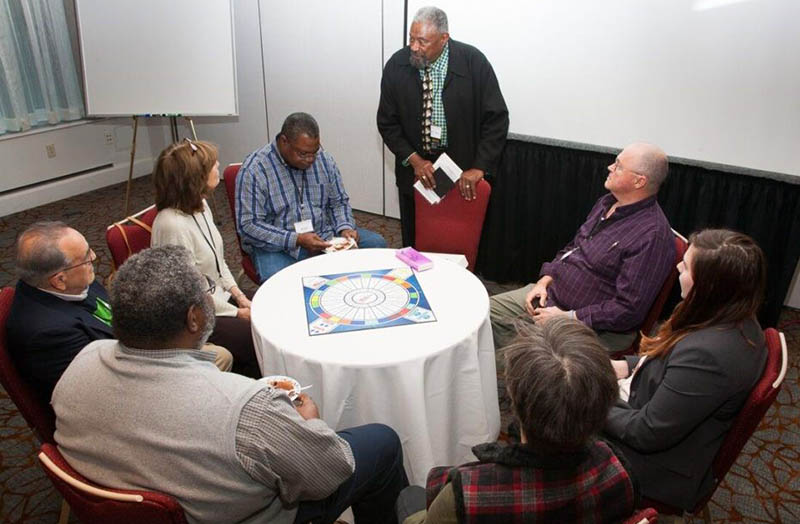



By Francisco Rendon
Conversations about race are difficult. It’s an issue that makes people feel vulnerable, so there is a need to form meaningful relationships in order to have meaningful dialogue, says William Smith, founding executive director of the National Center For Race Amity.
Such relationships are “always productive, though it takes some patience. But the beauty of race amity is that it is within everyone’s capacity,” he says. “You don’t have to go out and join something. We all are capable [of engaging in the work of race amity] because we all have friends. We all have the capacity to develop relationships with people across racial, cultural, ethnic and class lines.”
In order to provide spaces for people to develop this capacity at relationship building, the National Center for Race Amity (NCRA) is preparing a variety of initiatives to contribute to the discourse on race, including commemorating the 100th anniversary of the first Race Amity Conference in the United States.
The National Race Amity Virtual Conference will be held online May 21-23 and is being organized in close collaboration with a number of like-minded organizations and individuals. The program will include an opening panel of presenters featuring Johnnetta Cole, president and CEO of the National Council of Negro Women, and author Howard Ross, whose works include “Everyday Bias,” “ReInventing Diversity” and “Our Search For Belonging.”
Also featured are a 90-minute virtual program on the theme of “Embracing Race Amity” hosted by Celeste Headley of NPR and actor Rainn Wilson on Saturday evening; and a special interfaith service on Sunday. These two programs will be livestreamed on YouTube and Facebook Live and are free and open to the public. Visit raceamity.org for full conference registration and schedule details.
NCRA defines race amity, a term frequently used in its literature and work, as the ability “to overcome racial prejudice through association, amity, and collaboration,” celebrating the tradition of collaboration, friendship and love between people of different backgrounds that has unfolded parallel to the tradition of racial oppression in this country.
The Center draws inspiration from teachings of ‘Abdu’l-Bahá, son of Baha’u’llah, Founder of the Baha’i Faith: “Wherever you find the attributes of God love that person, whether he be of your family or of another. Shed the light of a boundless love on every human being whom you meet, whether of your country, your race, your political party, or of any other nation, color or shade of political opinion. Heaven will support you while you work in this ingathering of the scattered peoples of the world beneath the shadow of the almighty tent of unity.”


The first Race Amity Conference in 1921 was held based on instructions directly from ‘Abdu’l-Bahá. Agnes Parsons, a prominent DC socialite, had visited ‘Abdu’l-Bahá in Palestine in 1910 and, when ‘Abdu’l-Bahá came stateside in 1912, he stayed at her home in Washington, DC.
In 1920 Parsons again visited ‘Abdu’l-Bahá in Palestine, and at that time he asked her directly to arrange a convention promoting harmony among all races. She began collaborating with other Bahá’ís like lawyer Louis Gregory and professor Coralie Cook, and invited the participation of many like-minded organizations. That first Race Amity Conference drew more than two thousand people for a program that included poetry, singing, talks from political leaders, and more.
Smith says the history of collaboration between Bahá’ís and other faith communities on the issue of race amity runs very deep in the United States, and recalled the historical participation of communities like the First Congregational Church of Washington, DC, in that first Race Amity Conference.
That community feels like family, Smith says, “when you see the long dedication to race unity and race equity represented. I see why Agnes Parsons and Coralie Cook, the Bahá’ís who originally reached out to engage and organize this event, invited their participation.”
“What we’ve learned over the years is the best approach to engaging in the discourse on race is to establish a relationship with people with whom the discourse is intended or engaged,” Smith says. “Without a relationship, it will get bogged down. People have got to have a feeling for each other as human beings.”


Smith founded the NCRA at Wheelock College in Boston in 2010 with financial support of the Bahá’í Faith. The Center organized its first National Race Amity Conference in 2011.
In addition to the conference, the NCRA produced the film An American Story: Race Amity and the Other Tradition, broadcast on public television stations across the country. Later, WHS Media Productions produced the five-part series American Stories: Race Amity and the Other Tradition, broadcast in the Boston area.
The Center also created a board game, “Breaking it Down, Towards E Pluribus Unum,” which can be used as a tool to promote conversation on race and racial/cross-cultural amity. The phrase “E Pluribus Unum,” Latin for “Out of Many, One,” is the motto on the Seal of the United States and figures prominently in NCRA’s messaging.
Several years ago at the Center’s initiative the Senate passed a resolution naming June 12, 2016, as Race Amity and Reconciliation Day, and it has been working to get it onto the annual national calendar through an act of Congress.


![]()
![]()
Whether you are exploring the Bahá'í Faith or looking to become an active member, there are various ways you can connect with our community.
Please ensure that all the Required Fields* are completed before submitting.